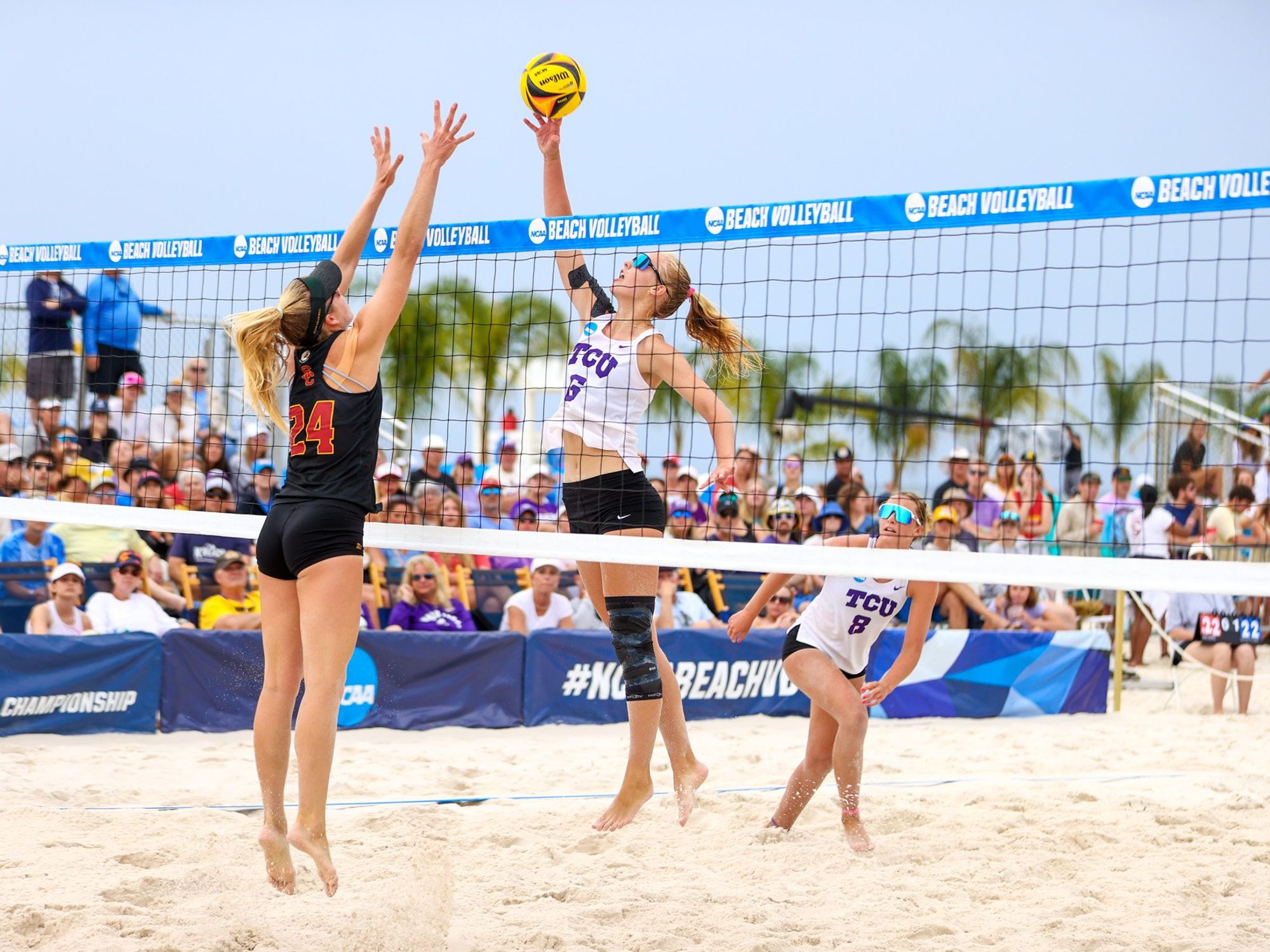Net gains
Fort Worth's best-kept secret is this TCU team that just competed for an NCAA championship

A record-breaking season for the "Sandy Frogs" ended with a Final Four appearance in Gulf Shores, Alabama.
In landlocked Fort Worth, beach volleyball might not be top of mind when it comes to recreational activities. After all, the nearest actual beach is at least a five-hour drive away.
But that hasn’t stopped the TCU Horned Frogs from establishing themselves as a powerhouse in what’s touted as one of the fastest-growing collegiate sports in the nation.
Last weekend in Gulf Shores, Alabama, the TCU women's beach volleyball team entered the NCAA Beach Volleyball National Championship tournament ranked No. 2 in the country. The “Sandy Frogs” went 37-3 this season and nearly faced No. 1 UCLA for the title before losing a tight matchup against No. 3 USC, who ended up winning the tournament as three-peat champions. Southern Cal has now won five championships.
Advancing to the NCAA Final Four this year (after sweeping No. 15 Stetson and No. 10 Stanford) was a first for TCU’s beach volleyball program, which was established in 2015. At the time, it was the only collegiate beach volleyball team in Texas, with colleges in coastal states like California and Florida dominating the field.
In 2016, Texas A&M Corpus Christi and Houston Christian added the sport, and just this season the University of Texas joined in as the only other Big 12 school to currently offer beach volleyball. (It is currently offered exclusively as a women's sport in the NCAA.)
A big “spike” in interest
TCU Beach Volleyball head coach Hector Gutierrez, who was just named the American Volleyball Coaches Association "Coach of the Year," says interest in beach volleyball is rising for several reasons, including lots of playing time for athletes.
“We play with five teams (of two), but at the end of the day, you have just one partner on the court, and you have to be involved in every play,” he says. “Players feel more in touch with the ball. There’s more opportunity.”
Olympic play has also contributed to increased popularity. In fact, three of Gutierrez’s star players, Daniela Alvarez, Tania Moreno (who were just named the AVCA "Pair of the Year"), and Maria Gonzalez, will skip next season to try to qualify for the 2024 Summer Olympics.
Gutierrez is confident his team will remain competitive next season with returning athletes and potential players available through the transfer portal. Since he joined the program in 2017, Gutierrez has led the Frogs to three NCAA championship tournament appearances in Gulf Shores, where white sand beaches, turquoise waters, and a lively entertainment district contribute to the excitement.
(Back home in Fort Worth, the TCU team practices and plays on sand courts on campus.)
Picturesque locations for tournaments that double as popular vacation destinations add to the allure of the sport for athletes, says Gutierrez. The now 17-team bracket tournament has been held in Gulf Shores since its inception in 2016 at The Hangout, a popular indoor-outdoor, beachfront bar, restaurant, and live music venue.
“Gulf Shores has provided an amazing championship experience for our student-athletes and fans,” says Kristin Fasbender, director of championships & alliances for the NCAA. “The competition venue is outstanding and the commitment by the community to grow the sport has been displayed over these past seven years.”
Fasbender says beach volleyball was the fastest sport to become an NCAA championship after being on the emerging sports list.
“Institutions are providing resources to grow their beach teams and add programs,” she says. “This sport continues to grow year in and year out because of its exciting nature and the passion of our institutions.”
Yet in Fort Worth, the team and the sport have stayed largely under the radar, especially compared to other sports that have put TCU in the national spotlight in recent years. The TCU beach volleyball team's Facebook page, for instance, has fewer than 3,000 followers. TCU football's page has 164,000 followers. Like most women's sports, the Sandy Frogs get little news coverage.
"On the weekends we get a lot of people, but are still trying to get more," says Gutierrez of home game attendance. "It’s very family-friendly. You see lots of families bringing their kids and alumni seeing each other. We’d always like to have more people. Everyone that comes seems to have great experience."
Beach volleyball vs. indoor volleyball
Those new to watching collegiate beach volleyball, as opposed to indoor volleyball, might be slightly confused upon arrival. First, there are multiple games going on at once, with five individual pairs – ranked 1 through 5 by skill level – playing an opponent pair of the same rank. (At TCU there are only four courts, so matches are played in two waves.) Each pair tries to win the best of three sets in a match, and the winning team is the first to take three of the five pairs’ matches. Sets are played to 21, except the third set (if needed), which is played to 15.
Second, don’t be surprised to see fans scurry from court to court, because as soon as one pair wins their match, the countdown is on for their teammates to do the same. Fans tend flock to whoever is closest to taking the next set.
If you’re used to watching indoor volleyball, you may also notice beach volleyball runs a tad slower in pace.
“The beach court is a little bit smaller than the indoor court, but there’s still a lot of court to cover, especially on the sand,” says Gutierrez. “The ball comes a little bit slower, but you still might have to run from one corner to the other. It’s a totally different strategy.”
Coaches also aren’t allowed to talk to players during actual play. It’s only during timeouts or side changes, which happens every seven points, that coaches can provide guidance. Gutierrez says it can be challenging to move from court to court, giving pointers to athletes in various locations.
Beach volleyball players must also endure the elements, like wind, sun, and even rain on occasion, which can make the ball heavier. But challenges aside, the continual positivity exuded by many college beach volleyball players is evident by the embraces between partners that seem to occur on both sides after every single play, good or bad.
“I tell the girls to hug each other. I feel it releases a lot of tension. It’s just you and your partner on the court. The personalities are different sometimes, but when you’re on the court, something needs to click,” says Gutierrez. “Some (coaches) tell their teams to do it and some others don’t. Hugging releases stress and says, ‘We’re close and we’re in this together.’”
To keep up with women's beach volleyball at TCU and catch a game next season, check their website and Facebook page.
